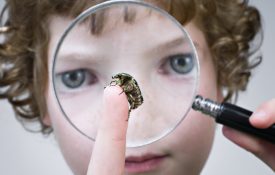-
In This Online Psychology Class, the Key Words Are Real Time
The New York Times: Before they took their seats in front of the camera under the warm lights of a new studio, Sam Gosling reminded his co-host, James Pennebaker, the chairman of the psychology department at the University of Texas at Austin, to run down the hall and apply his makeup. ... Introduction to Psychology was about to go live online as a synchronous massive online course. “The territory is so new here,” Mr. Gosling, a tenured professor, said the next morning.
-
Study shows NFL fans get fatter after their team loses
CBS Sports: Keep a close eye on your cholesterol, Raiders fans. A new study shows that fans of losing NFL teams tend to be more obese than fans of winning teams. Via For the Win's Nate Scott, we learn of Pierre Chandon, the L'Oreal Chaired Professor of Marketing, Innovation and Creativity at INSEAD Business Schoool, and his study of NFL fans and their chunkalicious responses to defeat. “One day after a defeat, Americans eat 16 percent more saturated fat, and 10 percent more calories," Chandon writes. "But on the day after a victory of their favorite team, then it's the opposite. They eat more healthily. They eat 9 percent less saturated fat, and 5 percent fewer calories.
-
Days late, dollars short
The Economist: There is a distinctive psychology of scarcity, argues Mr Mullainathan and Eldar Shafir, a psychologist at Princeton University. People’s minds work differently when they feel they lack something. And it does not greatly matter what that something is. Anyone who feels strapped for money, friends, time or calories is likely to succumb to a similar “scarcity mindset”. This mindset brings two benefits. It concentrates the mind on pressing needs. It also gives people a keener sense of the value of a dollar, minute, calorie or smile. The lonely, it turns out, are better at deciphering expressions of emotion. Likewise, the poor have a better grasp of costs.
-

Everyday Sadists Take Pleasure In Others’ Pain
People who score high on a measure of sadism seem to derive pleasure from behaviors that hurt others, and are even willing to expend extra effort to make someone else suffer, a study shows.
-
Nourishment for impoverished thinking
Poverty is emotionally crushing, and stigma only adds to that burden. The poor are often disparaged as lazy and incompetent—unable or unwilling to improve their own lot. Why don’t they go to school, eat more sensibly, and spend their money more wisely? In short, why don’t they make better decisions for themselves? It’s true that the poor do make poor choices, but not because of any personal failings. Poverty breeds lousy decision making. Think about it: Good decisions require attention and reasoning and mental discipline. How do you muster those powers when you are preoccupied with, well, being poor?
-
La separazione aumenta il rischio di depressione, ma solo per alcune persone (divorce increases the risk of depression, but only for some)
La Stampa: La separazione o il divorzio in una coppia sono eventi particolarmente stressanti, che possono portare a problemi mentali – specie in chi è più sensibile. Tra i diversi problemi di salute mentale cui si può incorrere c’è la depressione che, secondo un nuovo studio, è più probabile si manifesti in chi è predisposto perché in passato ha già sperimentato episodi depressivi. Lo studio è stato pubblicato su Clinical Psychological Science, una rivista della Association for Psychological Science, ed è stato condotto dai ricercatori dell’Università dell’Arizona.

